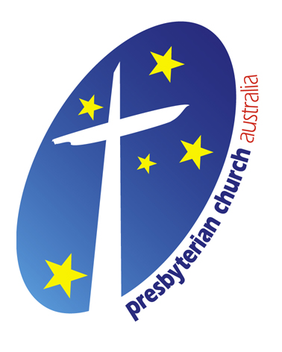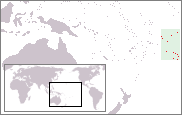
The Cook Islands is a self-governing island country in the South Pacific Ocean in free association with New Zealand. It comprises 15 islands whose total land area is 240 square kilometres (93 sq mi). The Cook Islands' Exclusive Economic Zone (EEZ) covers 1,960,027 square kilometres (756,771 sq mi) of ocean.
Demographic features of the population of the Cook Islands include population density, ethnicity, education level, health of the populace, economic status, religious affiliations and other aspects of the population.

Congregational churches are Protestant churches in the Reformed (Calvinist) tradition practicing congregationalist church governance, in which each congregation independently and autonomously runs its own affairs.

The Uniting Church in Australia (UCA) was founded on 22 June 1977, when most congregations of the Methodist Church of Australasia, about two-thirds of the Presbyterian Church of Australia and almost all the churches of the Congregational Union of Australia united under the Basis of Union. According to the church, it had 243,000 members in 2018. In the 2016 census, about 870,200 Australians identified with the church; in the 2011 census, the figure was 1,065,796. The UCA is Australia's third-largest Christian denomination, behind the Catholic and the Anglican Churches. There are around 2,000 UCA congregations, and 2001 National Church Life Survey (NCLS) research indicated that average weekly attendance was about 10 per cent of census figures.

A united church, also called a uniting church, is a denomination formed from the merger or other form of church union of two or more different Protestant Christian denominations, a number of which come from separate and distinct denominational orientations or traditions. Multi-denominationalism, or a multi-denominational church or organization, is a congregation or organization that is affiliated with two or more Christian denominations, whether they be part of the same tradition or from separate and distinct traditions.
The Wesleyan Methodist Church of Australia is a Christian denomination with its origins in Wesleyan Methodism. It is the organisational name for contemporary The Wesleyan Church in Australia.

The Presbyterian Church of Australia (PCA), founded in 1901, is the largest Presbyterian denomination in Australia. The larger Uniting Church in Australia incorporated about two-thirds of the PCA in 1977.
The Congregational Christian Church of Tuvalu, commonly the Church of Tuvalu, is a Christian Church which is the state church of Tuvalu, although this status merely entitles it to "the privilege of performing special services on major national events". Its adherents comprise about 97% of the ~11,000 inhabitants of the archipelago, and theologically, it is part of the Calvinist tradition.

Lutheranism is present on all inhabited continents with an estimated 81 million adherents, out of which 74.2 million are affiliated with the Lutheran World Federation. A major movement that first began the Reformation, it constitutes one of the largest Protestant branches, claiming about 80 million of 920 million Protestants, The Lutheran World Federation brings together the vast majority of Lutherans, the second largest grouping being the International Lutheran Council with 7.15 million in 46 countries. Apart from it, there are also other organisations such as the Confessional Evangelical Lutheran Conference, as well as multiple independent Lutheran denominations.
The United Church of Christ – Congregational in the Marshall Islands (UCCCMI) is a Protestant Christian church in the Marshall Islands. With approximately 40,000 members, the UCCCMI is the largest religious group in the Marshall Islands, accounting for about 55 percent of the population.
The Kiribati Uniting Church (KUC) is a united Protestant Christian denomination in Kiribati. With approximately 25,000 members, and 136 congregations, the KUC is the second-largest religious group in Kiribati and accounts for approximately 21 percent of the population of the country.

St Margaret's Uniting Church is a Uniting church in Hackett, Australian Capital Territory, Australia.

Cook Islanders are residents of the Cook Islands, which is composed of 15 islands and atolls in Polynesia in the Pacific Ocean. Cook Islands Māori are the indigenous Polynesian people of the Cook Islands, although more Cook Islands Māori currently reside in New Zealand than the Cook Islands. Originating from Tahitian settlers in the sixth century, the Cook Islands Māori bear cultural affinities with New Zealand Māori and Tahitian Mā'ohi, although they also exhibit a unique culture and developed their own language, which is currently recognized as one of two official languages in the Cook Islands, according to the Te Reo Maori Act of 2003.

Lesbian, gay, bisexual, and transgender (LGBT) persons in the Cook Islands face some legal challenges not experienced by non-LGBT residents, but these challenges have gradually lessened in recent years. As of 1 June 2023, homosexual acts between men became legal in the Cook Islands after a vote by the Parliament of the Cook Islands. Female homosexual acts have never been illegal. Same-sex marriage is outlawed. Nevertheless, LGBT people do enjoy some limited legal protections, as employment discrimination on the basis of sexual orientation has been banned since 2013.
The Congregational Christian Church Samoa (CCCS) is an international evangelical Christian Church originally established in Samoa by missionaries of the London Missionary Society.
William Fatianga Marsters was the first president of the Cook Islands Christian Church (CICC), the largest religious denomination in the Cook Islands.
The Kiribati Protestant Church (KPC) and earlier, the Gilbert Islands Protestant Church, is a Protestant Christian denomination in Kiribati. With approximately 10,000 members, and 136 congregations, the KPC was the second-largest religious group in Kiribati before creation of the new Kiribati Uniting Church and accounts now for approximately 8 percent of the population of the country.
In antiquity, Cook Islanders practiced Cook Islands mythology, before widespread conversion by the London Missionary Society during the nineteenth century. In modern times, the Cook Islands are predominantly Christian, with the largest denomination being the Cook Islands Christian Church.











